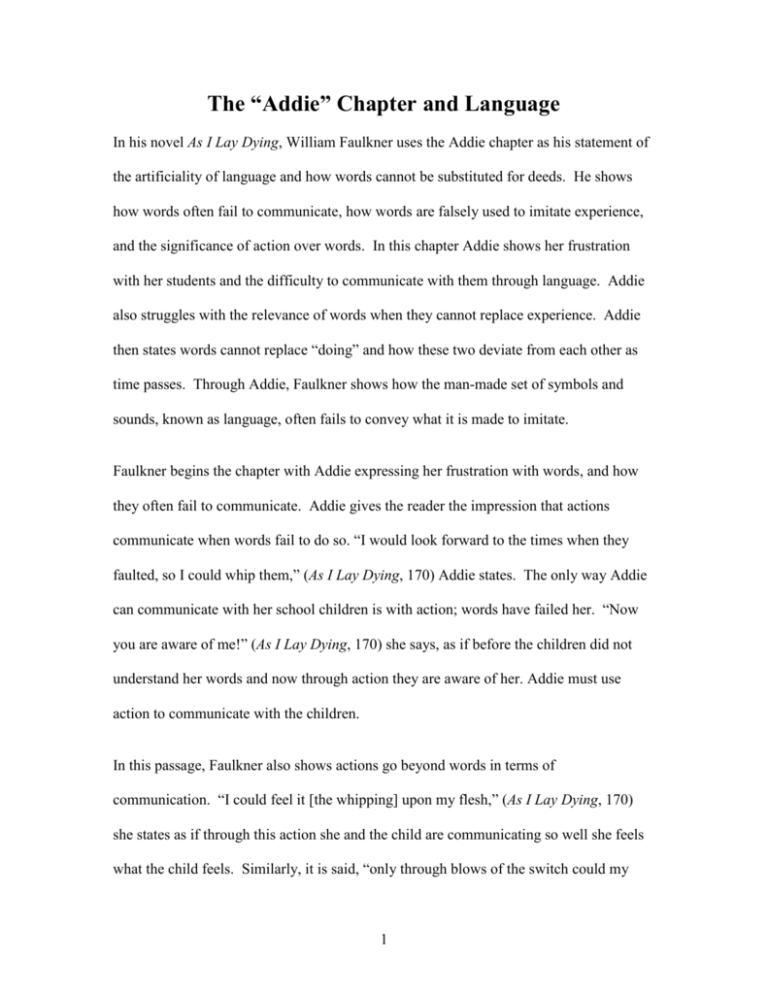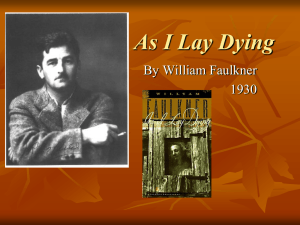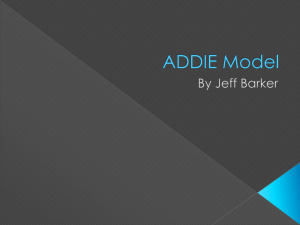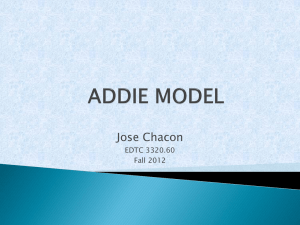The “Addie” Chapter and Language
advertisement

The “Addie” Chapter and Language In his novel As I Lay Dying, William Faulkner uses the Addie chapter as his statement of the artificiality of language and how words cannot be substituted for deeds. He shows how words often fail to communicate, how words are falsely used to imitate experience, and the significance of action over words. In this chapter Addie shows her frustration with her students and the difficulty to communicate with them through language. Addie also struggles with the relevance of words when they cannot replace experience. Addie then states words cannot replace “doing” and how these two deviate from each other as time passes. Through Addie, Faulkner shows how the man-made set of symbols and sounds, known as language, often fails to convey what it is made to imitate. Faulkner begins the chapter with Addie expressing her frustration with words, and how they often fail to communicate. Addie gives the reader the impression that actions communicate when words fail to do so. “I would look forward to the times when they faulted, so I could whip them,” (As I Lay Dying, 170) Addie states. The only way Addie can communicate with her school children is with action; words have failed her. “Now you are aware of me!” (As I Lay Dying, 170) she says, as if before the children did not understand her words and now through action they are aware of her. Addie must use action to communicate with the children. In this passage, Faulkner also shows actions go beyond words in terms of communication. “I could feel it [the whipping] upon my flesh,” (As I Lay Dying, 170) she states as if through this action she and the child are communicating so well she feels what the child feels. Similarly, it is said, “only through blows of the switch could my 1 blood and their blood flow as the same” (As I Lay Dying, 172). With this action Addie and the child have connected and the communication flows between them. Language often fails when people are trying to communicate, and a stronger connection is made through action rather than language. Later in the chapter Faulkner paints a wonderful picture that gives the reader a sense of distance between individuals when words are used. In her chapter Addie says, “to use one another by words like spiders dangling…, swinging and twisting and never touching” (As I Lay Dying, 172). The spiders swinging are like humans talking, they twist and struggle, but it is impossible for the spiders to touch as it is impossible for people to communicate with language. Faulkner creates this image to demonstrate to the reader it is difficult to communicate when words are used. Words “don’t ever fit what they are trying to say” (As I Lay Dying, 171), illustrates Faulkner’s most dominant under lying theme in the “Addie” chapter. Words are the artificial substitution used for experience by those who have not had it. The true meaning of language cannot be understood until the action it represents has been experienced. Addie asserts “words are no good,” (As I Lay Dying, 171) and are just trying to imitate feelings or actions that cannot be represented by language. Addie uses ‘motherhood’ as an example of a word that is “invented by someone who had to have a word for it” (As I Lay Dying, 171). Faulkner is emphasizing how language is just an invention of the human race and words cannot replace reality. Addie also affirms the word, ‘motherhood’, no longer counts once the action of motherhood has been experienced. For someone who has had a child she does not “care 2 whether there was a word for it or not” (As I Lay Dying, 172). According to Addie and Faulkner once a woman has a child she no longer needs the word to represent the idea of motherhood. However, for someone who has not experienced motherhood, a word is necessary to imitate the action. This invention of language can be lost once the experience has been gained because the reality is felt with emotions rather than words. Along with ‘motherhood,’ ‘love’ is used as an example of word that imitates one of the most elusive of feelings. Addie calls it Anse’s word, Anse being a symbol throughout the novel of one who substitutes words for action. Anse’s actions in the novel are all based on a single word, ‘promise’, which Addie tricks Anse into using like he did to her. Through Addie, Faulkner argues the word ‘love’ is used to fill the experience when the experience is not there. It is “just a shape to fill the lack” (As I Lay Dying, 172), or the word is just a symbol or sound to replace the feelings when they have not been experienced. The word ‘love’ merely imitates the actions associated with the reality of love, and cannot replace them. Once love occurs, “you wouldn’t need a word for that anymore” (As I Lay Dying, 172), and ‘love’ is forgotten. Similar to ‘motherhood,’ Addie explains ‘love’ can be left behind for those who need “a shape to fill the lack” (As I Lay Dying, 172). In the novel Addie experiences love through Cash. Cash represents the use of action over words when he builds the casket for his mother upon her death. “Cash did not need to say it to me nor I to him” (As I Lay Dying, 172), Addie recalls. Through the Addie-Cash relationship Faulkner is showing there is no need to say ‘love’ when the reality of it is there. In contrast, through the Addie-Anse relationship the Anse invention ‘love’ cannot replace 3 the actions Addie so desires. ‘Love’ is a topic of many volumes of language, trying to express feelings with words. In the “Addie” chapter Faulkner mocks all of this and says the word ‘love’ only mimics reality and cannot truly represent it. Faulkner continues to argue the artificiality of language with “sin and love and fear are just sounds that people who never sinned nor loved nor feared have for what they never had and cannot have until they forget the words” (As I Lay Dying, 173-4). Faulkner explains ‘sin’, ‘love’, and ‘fear’ are just imitations that do not truly represent reality. These sounds are for those who have never truly felt the feelings of sin, love and fear. Not only can these feelings not be expressed with these invented symbols, once they have been experienced they are no longer needed as a substitution. When the reality of sin, love or fear is felt it is not thought of in terms of ‘sin’, ‘love’, or ‘fear’ but in the terms of the feelings of reality. The words that imitate reality become obsolete with the experience. Along with arguing words do not fit what they say Faulkner illustrates words, even when they appear to mean great things, lose their significance over time. When talking to Cora Addie thinks, “how the high dead words in time seemed to lose even the significance of their dead sound” (As I Lay Dying, 175). Cora embodies words supposedly of high power when she speaks of God and religion. But to Addie these words are “dead” no matter their significance in meaning. The word is simply a sound that losses value because an imitation cannot last. Only the reality of actions and deeds can be remembered. In this passage, Faulkner is further illustrating the artificiality of language. 4 With the use of “dead words” of “dead sound” Faulkner creates a sense of lifelessness in the language as he does through most of the chapter. Faulkner continues his critique of language and explores the significance of action over words. In a very visual passage Faulkner explains “words go straight up…doing goes along the earth…after awhile the two lines are too far apart for the same person to straddle” (As I Lay Dying, 173). Faulkner is demonstrating how words go away from reality (earth) “quickly and harmlessly,” soon being forgotten. Actions, however, stay close to reality, “clinging to earth.” Actions are a permanent part of reality where words are elusive and temporary. Faulkner also expresses the notion of actions withstanding time. “I…have marked your blood with my own for ever and ever” (As I Lay Dying, 170), Addie says in regards to whipping her school children. This reminds the reader actions are never forgotten. A word may seem to represent an action but after awhile one does not hold the meaning of the word to the action because the word goes “straight up”, away from reality. In the “Addie” chapter of As I Lay Dying, Faulkner creates a very interesting statement in regards to language. Faulkner’s main mode of critique in this chapter is finding the faults in language. He demonstrates how words often fail to communicate, the artificial substitution of words for experience, and the importance of actions over words. This critique is very well placed within the chapter. Faulkner explicitly says “words are no good,” but in more subtle ways he evaluates communication and the lack of meaning in words. Through Addie’s reflections on life, her relationships, and well worded 5 metaphors Faulkner demonstrates to the reader his view of the artificiality of language and words. 6







